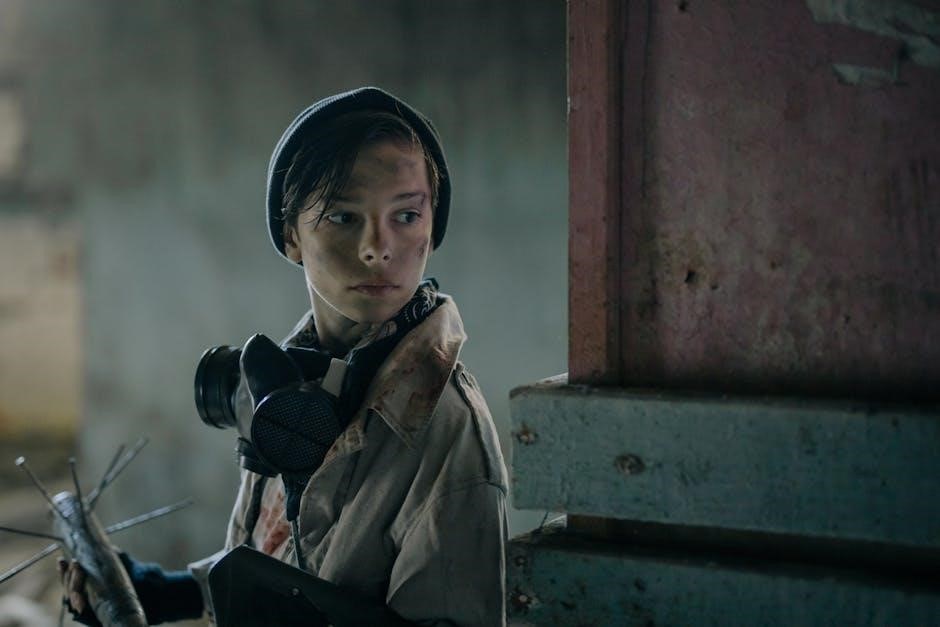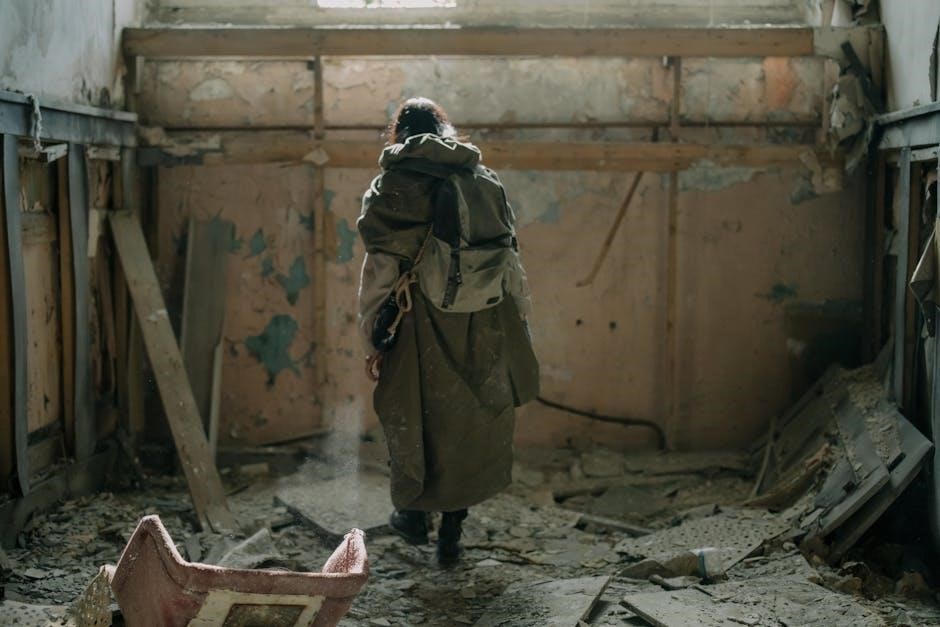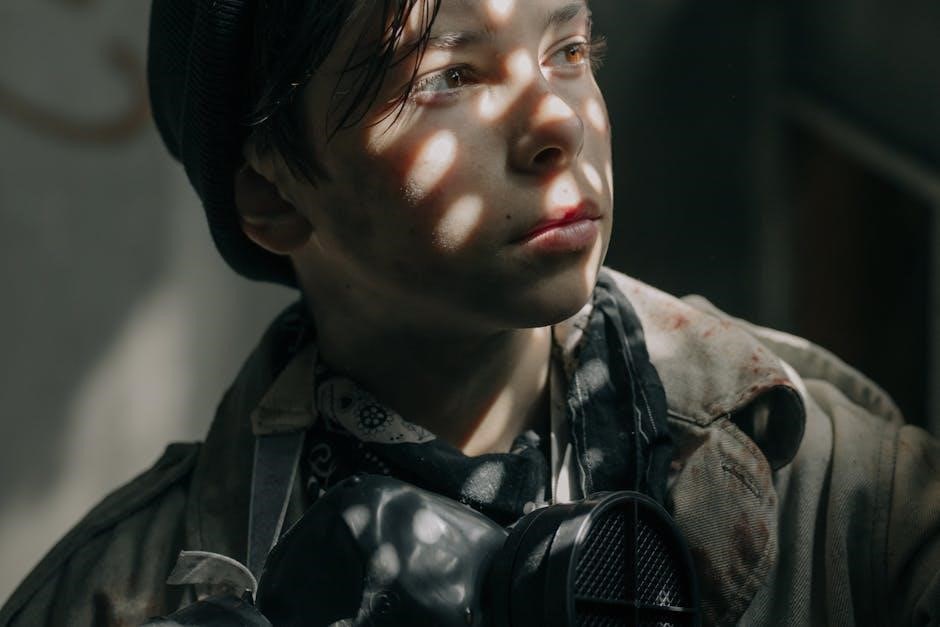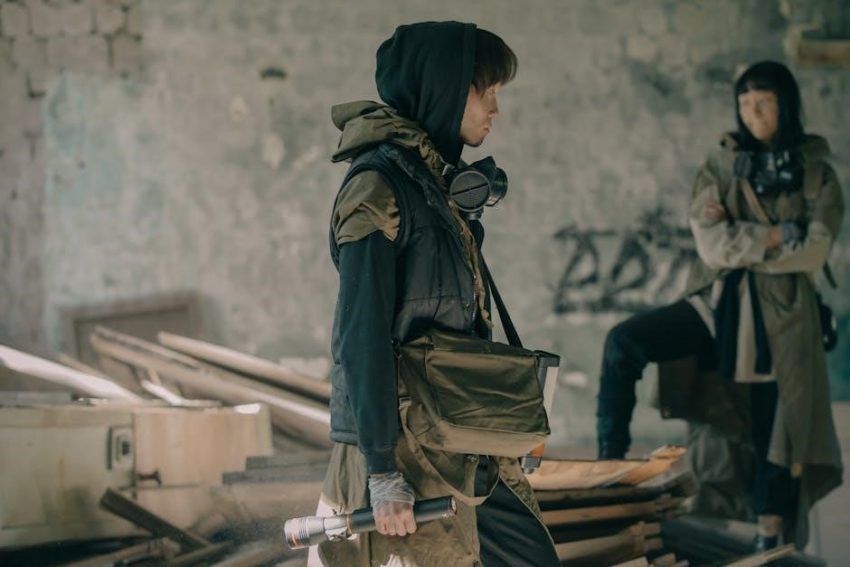Powered by the Apocalypse (PbtA) is a revolutionary RPG framework created by Meguey and Vincent Baker in 2010. It emphasizes narrative storytelling over complex rules, offering flexible gameplay and inspiring countless adaptations across genres, making it a cornerstone of modern tabletop role-playing games.
Overview of the PbtA System
The Powered by the Apocalypse (PbtA) system is a flexible RPG framework emphasizing collaborative storytelling and narrative-driven gameplay. Created by Meguey and Vincent Baker in 2010, it debuted in Apocalypse World and has since been adapted into numerous games across genres. The system focuses on simple, descriptive moves that guide player actions, encouraging creativity and dynamic problem-solving. The MC (Master of Ceremonies) facilitates the story, presenting situations and complications rather than scripting outcomes. PbtA games thrive on player agency, ensuring that every decision influences the evolving narrative. Its adaptability and focus on storytelling have made it a cornerstone of modern tabletop role-playing games, appealing to both new and experienced players alike.
History and Evolution of the Apocalypse World RPG
Apocalypse World, the foundational game of the PbtA system, was first released in 2010 by Meguey and Vincent Baker. It introduced a groundbreaking approach to tabletop RPGs, blending narrative storytelling with simple, flexible mechanics. Set in a post-apocalyptic world, the game emphasized collaborative storytelling and player-driven narratives. Its success led to the creation of the PbtA framework, which has since been adapted into numerous games across various genres. Apocalypse World’s innovative use of moves and the role of the MC revolutionized RPG design, inspiring a community of creators and players. Its legacy continues to grow, shaping the future of tabletop gaming with its adaptable and dynamic approach to storytelling.
Core Mechanics of the PbtA System

The PbtA system relies on simple, flexible rules, using moves triggered by specific actions or circumstances. Gameplay revolves around rolling 2d6, with outcomes guiding narrative progression and collaboration, emphasizing storytelling over complexity.
Key Moves and Their Role in Gameplay

Key moves are the backbone of the PbtA system, providing structured yet flexible actions for players to engage with the game world. These moves are triggered by specific in-game situations, such as attempting to manipulate someone or entering a dangerous area. When a move is triggered, players roll two six-sided dice, with outcomes determining narrative progression. A roll of 10+ typically results in success, 7-9 offers partial success with complications, and 6 or below leads to failure or unintended consequences. Moves like “Read a Person” or “Seize by Force” empower players to drive the story while maintaining collaborative storytelling. This mechanic ensures that gameplay remains dynamic, with outcomes shaping the narrative and fostering creativity at the table. By focusing on clear, actionable prompts, key moves streamline decision-making, allowing players and the MC to co-create compelling experiences seamlessly.
The Role of the MC (Master of Ceremonies)
The MC (Master of Ceremonies) serves as the game’s facilitator, storyteller, and rules arbiter in PbtA games. Their primary role is to create a compelling narrative, present meaningful choices, and guide players through the story. The MC prepares the setting, controls non-playable characters (NPCs), and introduces threats or complications to advance the plot. They also ensure rules are applied fairly and maintain the game’s tone and pacing. Unlike traditional GMs, the MC avoids pre-scripted outcomes, instead reacting to players’ decisions and moves. By fostering collaboration and improvisation, the MC helps create a dynamic, player-driven story, making the game engaging and unpredictable for everyone involved.

Popular Games Using the PbtA Framework
Apocalypse World, Dungeon World, and Monsterhearts are prominent PbtA games, showcasing the system’s versatility across post-apocalyptic, fantasy, and supernatural genres, attracting diverse player audiences worldwide.
Apocalypse World and Its Legacy
Apocalypse World, created by Meguey and Vincent Baker in 2010, is the cornerstone of the PbtA system. It introduced a collaborative storytelling approach, focusing on narrative depth and player agency. The game’s success lies in its simple yet robust mechanics, which encourage creative problem-solving and emotional engagement. Apocalypse World has inspired numerous adaptations, such as Dungeon World and Monsterhearts, each offering unique twists while maintaining the core PbtA principles. Its influence extends beyond gaming, shaping modern RPG design and fostering a community dedicated to storytelling and collaboration. Apocalypse World’s legacy is marked by its ability to evolve and adapt, ensuring its relevance in the ever-growing tabletop RPG landscape.
Examples of PbtA Adaptations in Other RPGs
The PbtA system has been adapted into numerous RPGs, each offering unique twists while retaining core mechanics. Dungeon World reimagines fantasy adventures, emphasizing exploration and heroic quests. Monsterhearts explores teenage angst and supernatural drama, focusing on emotional conflicts. Ironsworn shifts the setting to a Viking-inspired world, blending PbtA principles with Perilous Journey mechanics. These adaptations demonstrate the system’s versatility, allowing designers to craft diverse narratives and genres. Each game maintains the collaborative storytelling and player-driven approach of Apocalypse World, proving the framework’s adaptability and enduring appeal across different themes and settings.
Creating Your Own PbtA Game
Designing a PbtA game involves defining the setting, creating custom moves, and crafting playbooks. Start by identifying the game’s core theme and desired player experience, then build mechanics that support these elements. Draw inspiration from existing PbtA titles and adapt their structures to fit your vision. Playtesting is crucial to refine moves and ensure they promote engaging storytelling. Utilize online resources like the PBtA subreddit and guides from Cannibal Halfling Gaming for tips and community support during the creation process.
Designing Moves for Your Game
Designing moves for a PbtA game involves crafting clear, thematic actions that guide player behavior and narrative flow. Moves are rules that trigger specific outcomes, ensuring consistency while fostering creativity. Start by identifying key actions players should take, aligning them with your game’s theme. Use simple, concise language and avoid overly complex mechanics. Consider both general moves (universal actions) and playbook-specific moves (unique to roles). Playtesting is essential to refine moves, ensuring they promote engaging storytelling. For inspiration, study existing PbtA games and adapt their structures. Online resources, like guides from Cannibal Halfling Gaming, offer valuable tips for creating balanced and impactful moves that enhance gameplay.
Building Playbooks and Character Roles
Playbooks are central to PbtA games, defining character roles and unique abilities. Each playbook outlines specific moves and playstyles, ensuring diverse and engaging narratives; Start by identifying core roles your game requires, then design moves and traits that reflect these roles. Use existing games like Apocalypse World or Dungeon World as inspiration. Ensure playbooks are balanced, offering both narrative depth and mechanical utility. Playtesting is crucial to refine roles and ensure they align with your game’s theme. Custom playbooks can also be created for unique settings, allowing players to embody distinct characters while maintaining the game’s cohesive structure; This approach fosters dynamic storytelling and player investment.

Community and Resources for PbtA Enthusiasts
The PbtA community thrives online, with forums like EN World and Reddit’s r/PBtA offering discussions, guides, and resources. Fans share custom playbooks, hacks, and tips, fostering creativity and collaboration across the globe.
Online Forums and Discussions
The PbtA community is vibrant and active across various online platforms. Forums like EN World and Reddit’s r/PBtA host lively discussions, where enthusiasts share experiences, seek advice, and showcase custom content. Players and designers frequently exchange tips on game creation, hacks, and playbooks. Role-playing Games Stack Exchange offers detailed guides and answers to common questions, while platforms like Cannibal Halfling Gaming provide introductory resources for newcomers. These spaces foster collaboration, with fans often sharing PDFs of custom playbooks and hacks. The open dialogue and shared creativity within these communities have become a cornerstone of the PbtA ecosystem, driving innovation and engagement among its passionate fan base.
Guides and Tutorials for Game Creation
Creating a PbtA game is made easier with comprehensive guides and tutorials available online. Resources like “Level One Wonk: A Novices Guide to Powered by the Apocalypse” provide step-by-step advice for new designers. Tips on crafting unique moves, building playbooks, and adapting the system to different genres are widely shared. Communities on platforms like Reddit and Role-playing Games Stack Exchange offer insights and examples from experienced creators. These resources cover everything from basic concepts to advanced hacks, ensuring both newcomers and seasoned designers can refine their craft and bring innovative ideas to life within the PbtA framework.
Powered by the Apocalypse (PbtA) has revolutionized tabletop role-playing games with its flexible, narrative-driven framework. Created by Meguey and Vincent Baker in 2010, it has inspired countless adaptations across genres, making it a cornerstone of modern RPG design. The system’s emphasis on collaborative storytelling and dynamic gameplay mechanics has fostered a vibrant community of creators and players. With extensive resources, including guides like “Level One Wonk” and active forums, PbtA continues to empower both newcomers and seasoned designers. Whether you’re exploring existing games or crafting your own, PbtA offers endless possibilities for immersive storytelling and creative expression, solidifying its place as a timeless innovation in the world of tabletop gaming.

